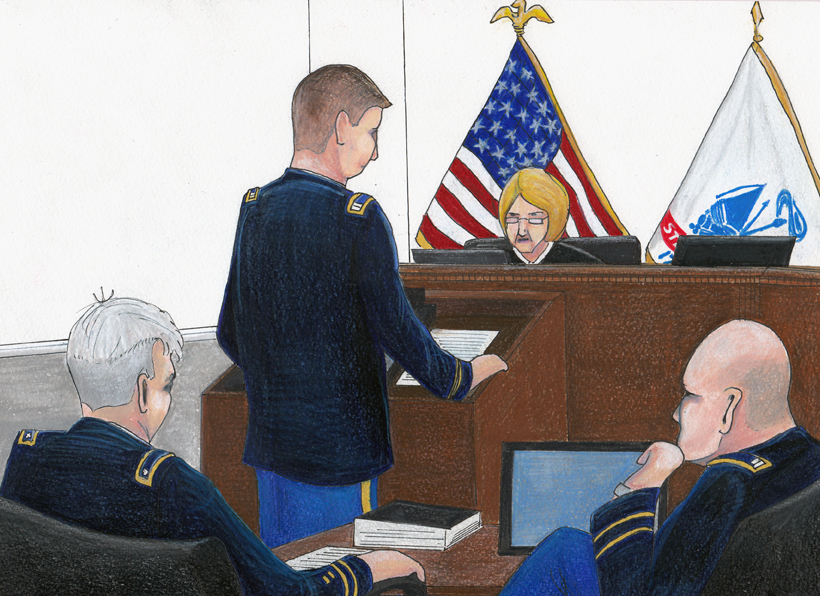Government seeks to block reference to Bradley Manning’s whistle-blower motives
In this week’s January 8-11 hearing at Fort Meade, the government brings multiple motions that attack the core of Bradley Manning’s defense: namely that he blew the whistle on war crimes and that the documents released shouldn’t have been classified in the first place. We’ll summarize each day’s proceedings here at BradleyManning.org.
By Nathan Fuller, Bradley Manning Support Network. January 7, 2013.
 The next hearing for PFC Bradley Manning may not appear to have to the same dramatic flair that the Article 13 hearing had – with long hours of vital testimony, courtroom presentations of Bradley’s tiny cell and coarse blanket, and Bradley himself taking the stand – but it could have a major impact on the remainder of the trial. At Fort Meade, MD, from January 8-11, the government will argue multiple motions that could change the way Bradley is allowed to defend himself in court.
The next hearing for PFC Bradley Manning may not appear to have to the same dramatic flair that the Article 13 hearing had – with long hours of vital testimony, courtroom presentations of Bradley’s tiny cell and coarse blanket, and Bradley himself taking the stand – but it could have a major impact on the remainder of the trial. At Fort Meade, MD, from January 8-11, the government will argue multiple motions that could change the way Bradley is allowed to defend himself in court.
The government is moving to remove discussion of Bradley Manning’s motive in the merits (guilt/innocence) portion of the trial, contending that motive doesn’t change whether an act occurred or not and is therefore irrelevant to determining Bradley’s guilt. This is yet another attack on Bradley Manning’s whistle-blower defense, because the government doesn’t want the court to hear why Bradley released documents, that he observed high-level crimes and abuse and couldn’t abide by them as other soldiers did.
In a similar vein, the government is also moving to preclude discussion of overclassification. If Judge Denise Lind granted this motion, Bradley couldn’t explain that the U.S. suffers a massive secrecy problem and that these documents should not have been classified in the first place.
Judge Lind could make a ruling on these motions this week, and she could also rule on last month’s Article 13 motion. She could throw out the charges altogether if she recognizes that Bradley was unfairly punished, or she could grant multiplied credit at sentencing (for example, 10 days of credit for every day he was in solitary confinement), or she could grant merely the seven days total credit for the days Bradley was on Suicide Risk against psychiatrists’ orders, as the government proffered.
We believe that since Article 13 was clearly violated and Bradley was punished before trial, the charges against him should be dismissed. However, we would see Judge Lind awarding extensive credit for potential sentencing as a step in the right direction: if she later decides to throw out the egregious and pernicious ‘aiding the enemy’ charge, sentencing credit could severely reduce the remaining sentence.
Following this hearing, the defense will conclude its speedy trial motion on January 16-17. Next month, shorter hearings will deal with discussion of how to handle classified information during trial, and when to close sessions to the public. By the time Bradley gets to trial, currently scheduled for March 6, 2013, he’ll have been in prison awaiting court-martial for more than 1,000 days.
By Nathan Fuller, Bradley Manning Support Network. January 7, 2013.

Government prosecutors speaking to Judge Denise Lind. Sketch by Clark Stoeckley (BMSN).
The government is moving to remove discussion of Bradley Manning’s motive in the merits (guilt/innocence) portion of the trial, contending that motive doesn’t change whether an act occurred or not and is therefore irrelevant to determining Bradley’s guilt. This is yet another attack on Bradley Manning’s whistle-blower defense, because the government doesn’t want the court to hear why Bradley released documents, that he observed high-level crimes and abuse and couldn’t abide by them as other soldiers did.
In a similar vein, the government is also moving to preclude discussion of overclassification. If Judge Denise Lind granted this motion, Bradley couldn’t explain that the U.S. suffers a massive secrecy problem and that these documents should not have been classified in the first place.
Judge Lind could make a ruling on these motions this week, and she could also rule on last month’s Article 13 motion. She could throw out the charges altogether if she recognizes that Bradley was unfairly punished, or she could grant multiplied credit at sentencing (for example, 10 days of credit for every day he was in solitary confinement), or she could grant merely the seven days total credit for the days Bradley was on Suicide Risk against psychiatrists’ orders, as the government proffered.
We believe that since Article 13 was clearly violated and Bradley was punished before trial, the charges against him should be dismissed. However, we would see Judge Lind awarding extensive credit for potential sentencing as a step in the right direction: if she later decides to throw out the egregious and pernicious ‘aiding the enemy’ charge, sentencing credit could severely reduce the remaining sentence.
Following this hearing, the defense will conclude its speedy trial motion on January 16-17. Next month, shorter hearings will deal with discussion of how to handle classified information during trial, and when to close sessions to the public. By the time Bradley gets to trial, currently scheduled for March 6, 2013, he’ll have been in prison awaiting court-martial for more than 1,000 days.

No comments:
Post a Comment